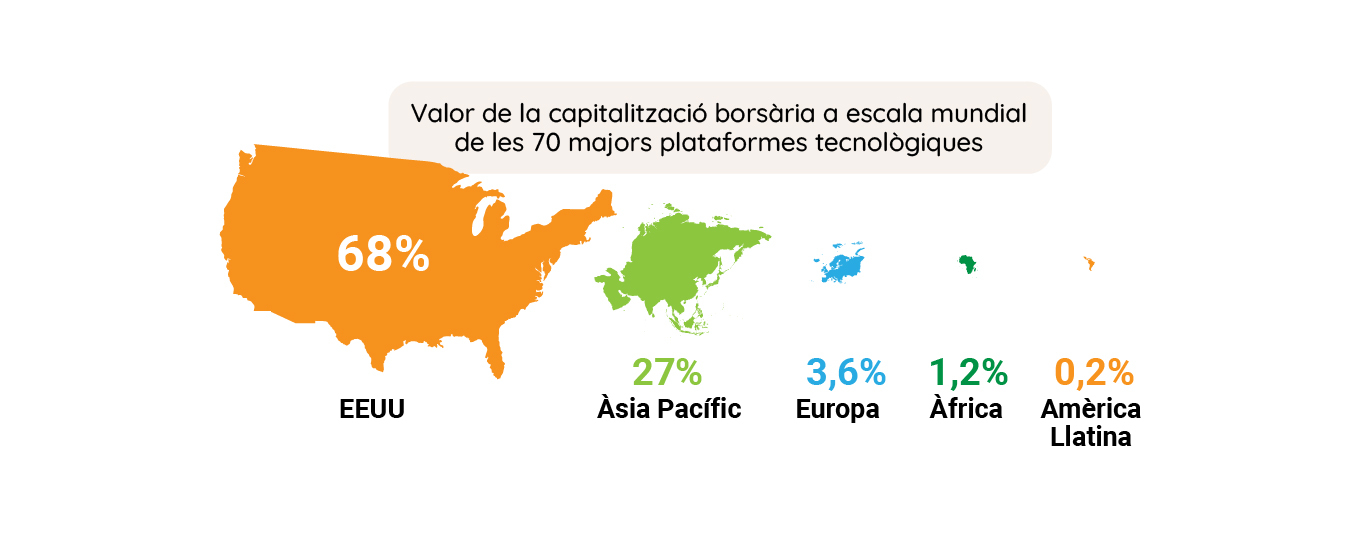

Is Europe’s digital sovereignty feasible?
In the field of technology and the digital revolution, Europe is subordinated to the two great superpowers, the United States and China. The most recent realisation has been the microchip and semiconductor crisis. In 11Onze we look at how technological power is distributed around the world and how the European Union is struggling to build its digital sovereignty. Will it succeed?
Europe surfed the first wave of the technological revolution so superficially that it failed to counter US hegemony on the internet, but it needs to take advantage of the next wave. The European Commission recognises that Europe’s digital transformation and sovereignty are of paramount importance, and has set out a strategic plan to develop its own digital capabilities and technologies.
The new Cold War and growing tensions between the United States and China are an additional incentive for Europe to achieve technological independence if it is to avoid the risk of becoming a battleground in the struggle for technological and industrial supremacy between these two countries. The implementation of 5G networks and the US economic sanctions against China, under the excuse of espionage, are perfect examples.
The unilateral decision by President Trump’s administration to pull the United States out of the Iran nuclear deal and implement new economic sanctions highlighted the European Union’s inability to maintain a modicum of geopolitical sovereignty. Timid attempts by European states to create an alternative banking transaction system to SWIFT, to circumvent Washington’s threats and preserve the Iran deal, came to nothing.
Still, if we have learned anything from the Covid-19 pandemic, it is that digital infrastructure has been fundamental to social welfare and to the functioning of the economy. Digital connectivity has allowed us to maintain a certain normality when it comes to the general population getting access to educational and medical services during confinement, which would hardly have been possible without this technological metamorphosis.
Keeping Europe competitive
The single market is at the heart of making Europe’s digital economy a world leader, and the European Commission proposed a strategic plan to adapt the same concept to the digital realm. An ambitious project that has been expanded over the years and aims to strengthen the EU’s digital economy by improving the accountability and security requirements of digital platforms and service providers.
In this sense, last December, an investment of one billion euros was announced to support the Connecting Europe Facility (CEF) programme, which defines the scope of application of the measures supported by the European Union, necessary for the creation of infrastructures and connectivity projects of common interest to its member states.
The recently announced new rules for the distribution of open-source software are another measure designed to make the source code of their software accessible to the public for the benefit of public services, businesses, and citizens, and thus encourage innovation.
All these proposals and measures seek to ensure that the European Union is not only a leader in the regulatory field, but can also compete or maintain a modicum of sovereignty in a geostrategic sector that is increasingly essential.
11Onze is the community fintech of Catalonia. Open an account by downloading the super app El Canut for Android or iOS and join the revolution!






Sí, històricament Europa sempre s’ha caracteritzat per la cautela, i si amb alguna cosa es experta Europa es en no precipitar-se. Però com en totes les coses, ser cautelós té el seu inconvenient que és la poca ràpidesa en pendre decisions. La veritat, jo preferisc aquesta Europa sense lideratges que encara que es lenta no s’arrisca amb guerres absurdes ni arrastra a ningú amb decisions precipitades. Tot i que els temps canvien i cada cop més tot va més ràpid, i aixó requereix pendre decisions ràpides, la característica lentitud d’Europa ens pot passar factura sí. Però estic convençut que aquest món cada cop més veloç tard o d’hora començarà a frenar-se i tot tornarà al seu lloc de mica en mica i la lentitud Europea tornarà a posar-se de moda amb la seua elegància. 😌
Totalment d’acord amb tu, Jordi! De nou l’evolució i les decisions ens empenyen i hem de saber trobar l’equilibri per sortir-ne benparats. Gràcies de nou pels teus comentaris.😉
👏
👍
Doncs ja ens aniria be, i de passada una bona empenta per nosaltres els Catalans 👏👏💪💪
Doncs sí, Jesús, tota la raó del món… Moltes gràcies pel teu comentari!!!
A veure si espavilem.
Doncs sí, ens anirà bé. Moltes gràcies pel teu comentari, Joaquim!!!
Ok 👍
Gràcies, Josep!!!
El problema es aquest elefant burocràtic que es el parlament europeu i per suposat que l’Unió europea ho és sobre el paper
Malauradament, hi ha massa burocràcia al món… Moltes gràcies pel teu comentari, Alícia!!!
La sensació és que la UE és, de sempre, lenta en les decisions i poc àgil en portar-les a terme.
Reglament rera reglament al qual cada país ha d’adaptar les seves pròpies lleis. Veurem què passa.
Tens raó, Mercè. Com tu dius, veurem que passa…
👌
Gràcies, Joan!!!